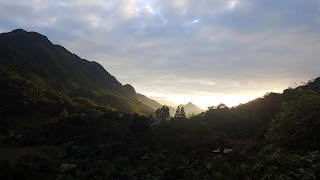A personal essay by Marissa Brann
Humans are natural storytellers, but what does it mean when the stories we tell are misremembered or false?
Foolish as it seemed at the time, my parents were correct. Though my fourteen-year-old self agonizes over my admittance of this, this same phrase has become a frequent part of my vocabulary in recent years.
Something didn’t fit in the red, brown, and green landscape I saw before me, made cloudy by my tears. Dirty huts and metal sheet roofs were juxtaposed with a brilliant white building. The sun high and beaming made the building glitter, a visible aura of golden light bordering it. Beautiful music accompanied this sight, along with a lapse in what felt like the jungle's constant hum. Voices caught my attention, and what was once a harsh, scary-sounding language was now smooth and welcoming. There were high, wrought iron fences enclosing it, clearly out of place amongst a sea of chicken wire, though they felt protective and beautiful instead of intimidating. An LDS church building, the only one in hundreds of miles, stood before me. Safety. I cannot begin to explain the peace and utter knowledge I had that I was safe. My family was still nowhere to be found. My cries for help still fell on Q'eqchi'-speaking ears. But I was safe.
I do not pretend to claim that this building in rural Guatemala was a temple. I can with reasonable confidence conclude that the church building was not white, but the red-brown brick that characterizes so many LDS church buildings. The same red-brown that is so natural to me in my own country. At home, this red building is Sunday morning doodles in my notebook. This building is Wednesday night activities and teenage resistance. This building means reverence, obedience, and patience. This building is wintergreen LifeSavers. At home, this building is an obligation. But here in this foreign place, it is more familiar than ever. Frozen in my mind is this white building, beautifully glimmering in the Guatemalan sun. I simply cannot picture it any other way. I believe this moment to be frozen in time, incorrectly remembered in the most correct way.
We are Storytellers
We become the storytellers of our own lives, seeking reason and revelation from our experiences. Certainly, a glowing white building in the jungle does more for the story than a dusty red and brown building in an impoverished village. But what does it do for me? How many life decisions have been shaped because of this faulty memory? My father has an intense fear of lightning, stemming from his childhood when he distinctly remembers lightning striking within feet of him. My grandmother, however, says it was no closer than 2 miles from them. And yet, years of reason and choice have been shaped because of this incorrectly remembered moment. Do we learn more from experiences as they are, or as they are remembered? If my father remembered this childhood experience correctly, perhaps his life would be wildly different than it is now.Our lives are rarely as interesting as we remember them. This stems from humanity's innate ability to create art, music, life, and stories. John Gottschall’s novel The Storytelling Animal examines the way stories set humans apart. He argues that telling stories is part of being human, and it is an unavoidable characteristic of the way we perceive our lives. We understand, communicate, emote, and connect through stories.
In Genesis, we learn that we have been created in God’s image. This means two things; we physically resemble God, and we seek to create, like Him. The stories we tell are meant to be told, and it is our way of becoming like Him. I would go so far as to argue that we need story. Embellishment is natural, and part of our journey to tell the stories of our lives. But is embellishment essential to our understanding of our reality? Does our brain purposely maintain certain faulty memories as an avenue through which we can relate back to and make decisions off of? Not every faulty memory has a deep, lasting impact on us, and for those memories, perhaps they live in our psyche as evidence of our storytelling nature. But for the memories that truly did have a lasting impact, I believe we seek to find that impact in an effort to create meaning for our lives.
Incorrect memories can become more profound over time as our subconscious alters the details to fit the narrative of our lives in an effort to derive greater meaning from it. This is part of our storytelling nature. As time goes on, the Q'eqchi' language sounds more foreign, the church gets whiter, and the sense of juxtaposing panic and peace becomes greater in extremes. Over the years, this memory has changed in significance and meaning, and yet I do not know if it truly happened as I remember it. But ultimately it does not matter if the memories we derive meaning from are true. As we seek to make sense of the world around us, our memories serve to guide us.




No comments:
Post a Comment